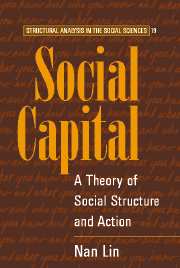
-
Select format
-
- Publisher:
- Cambridge University Press
- Publication date:
- 05 June 2012
- 29 January 2001
- ISBN:
- 9780511815447
- 9780521474313
- 9780521521673
- Dimensions:
- (228 x 152 mm)
- Weight & Pages:
- 0.525kg, 294 Pages
- Dimensions:
- (228 x 152 mm)
- Weight & Pages:
- 0.43kg, 294 Pages
- Subjects:
- Social Theory, Sociology
- Series:
- Structural Analysis in the Social Sciences (19)
You may already have access via personal or institutional login- Subjects:
- Social Theory, Sociology
- Series:
- Structural Analysis in the Social Sciences (19)
Book description
In Social Capital, Nan Lin explains the importance of using social connections and social relations in achieving goals. Social capital, or resources accessed through such connections and relations, is critical (along with human capital, or what a person or organization actually possesses) to individuals, social groups, organizations, and communities in obtaining their objectives. This book places social capital in the family of capital theories (the classical and neo-capital theories), articulates its elements and propositions, presents research programs, findings, and agenda, and theorizes its significance in various moments of interactions between individual actions and social structure (for example, the primordial groups, social exchanges, organizations, institutional transformations and cybernetworks). Nan Lin eloquently introduces a groundbreaking theory that forcefully argues and shows why it is 'who you know', as well as 'what you know' that makes a difference in life and society.
Reviews
'… one of the most rigorous, consistent and empirically informed theoretical analysis of social capital available.'
Source: Local Government Studies
Contents
Metrics
Altmetric attention score
Full text views
Full text views help Loading metrics...
Loading metrics...
* Views captured on Cambridge Core between #date#. This data will be updated every 24 hours.
Usage data cannot currently be displayed.
Accessibility standard: Unknown
Why this information is here
This section outlines the accessibility features of this content - including support for screen readers, full keyboard navigation and high-contrast display options. This may not be relevant for you.
Accessibility Information
Accessibility compliance for the PDF of this book is currently unknown and may be updated in the future.


